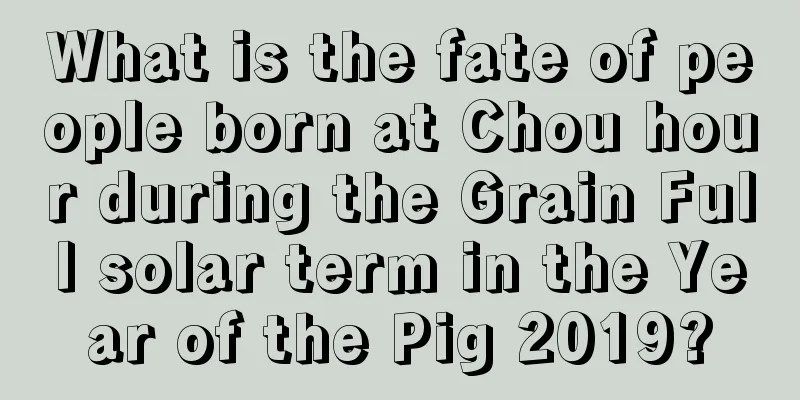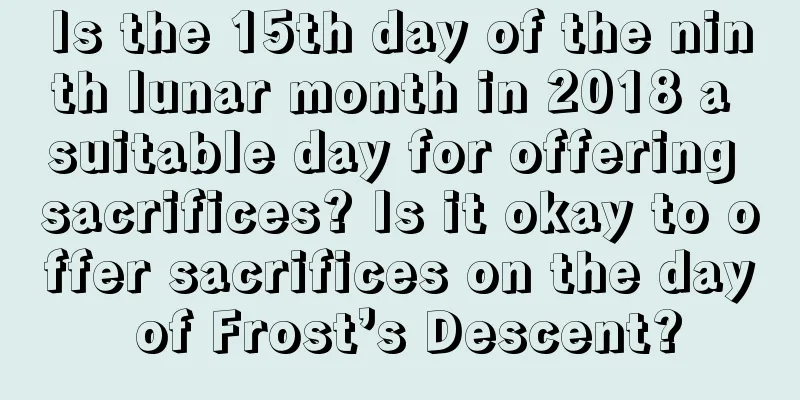What festival is on the 23rd day of the twelfth lunar month? Are there any do’s and don’ts?

Introduction: Many people may feel unfamiliar with the 23rd day of the twelfth lunar month. What day is this? If I say Little New Year's Eve, everyone may be familiar with it. The twenty-third day of the twelfth lunar month is what we often call Little New Year's Eve. Are there any special folk customs on the day of Little New Year’s Eve? What should I do on this day? What should not be done? With these questions, please follow the editor to learn more! Families reunite on New Year’s Eve, and the Chinese New Year is the most important festival for our Chinese nation. If you want to know more about the culture and content of the New Year’s Eve, please go to the New Year’s Eve special topic carefully compiled for you by Mr. Shui Mo to learn more!When is the Little New Year in 2017?The Northern New Year's Eve falls on the 23rd day of the 12th lunar month, which is January 20, 2017. The Little New Year in the south falls on the 24th day of the twelfth lunar month, which is January 21st in 2017. Northerners regard the 23rd day of the twelfth lunar month as the Minor New Year, which is called "sweeping the house"; Southerners regard the 24th day of the twelfth lunar month as the Minor New Year, which is called "dusting".What is the Big Year and what is the Small Year?The Spring Festival celebrated by the Han people is called "Big Year" by the Mongolians. Before the New Year, they would slaughter good cattle and sheep, make new clothes, and prepare all kinds of exquisite foods. On the night of New Year's Eve, the whole family sits around a table filled with meat, dairy products and fine wine. A large piece of paper with the names of ancestors written on it is placed on the table to show that they are reuniting with their ancestors to eat, sing and dance. This is called "Shousui". From the first to the fifth day of the New Year, everyone mounted their horses. Bring Hada and good wine and wish a happy new year to relatives and friends one by one. People who pay New Year's greetings often bring a small bag of tea with them, which means "bringing happiness home."The twenty-third day of the twelfth lunar month in the depths of winter is called "Minor New Year", but the meaning of "Minor New Year" here is completely different from celebrating the Minor New Year during the "Winter Solstice". The ancients regarded the "Winter Solstice" as the beginning of the new year, and the month of "Winter Solstice" in the lunar calendar was likened to the first month of the year. The 23rd day of the twelfth lunar month is approaching New Year's Eve, and it means preparing to celebrate the "Little New Year" on New Year's Eve. To distinguish it from the Little New Year on the "Winter Solstice", people generally set the 23rd day of the twelfth lunar month as the "Kitchen God Worship Day". What are the customs on the 23rd day of the twelfth lunar month?Offering sacrifices to the kitchen god and eating kitchen candyThe custom of sending off the Kitchen God is very common in all parts of my country. Mr. Lu Xun once wrote a poem called "Sending Off the Kitchen God in the Gengzi Year": A chicken and some gummies, pawning clothes to offer incense. There is nothing valuable in the house, not just the yellow sheep. In his article "Random Thoughts on Sending Off the Kitchen God", he said: "On the day when the Kitchen God ascended to heaven, a kind of candy as big as a tangerine was sold on the street. We also have this thing where we are, but it is flat, like a thick pancake. It is the so-called 'sticky candy'. The original intention was to invite the Kitchen God to eat it so that his teeth would stick to it and prevent him from parroting and saying bad things about the Jade Emperor." The allusion to 'yellow sheep' in Lu Xun's poem comes from "Book of the Later Han Dynasty·Biography of Yin Shi": "During the time of Emperor Xuan, Yin Zifang was very filial and benevolent. On the morning of the twelfth lunar month, when cooking, the Kitchen God appeared. Zifang bowed twice to receive the congratulations. His family had a yellow sheep, so they offered it to the Kitchen God. From then on, they became extremely wealthy. By the third generation of Shi, the family prospered. Therefore, they often offered yellow sheep to the Kitchen God on the twelfth lunar month." Yin Zifang saw the Kitchen God and killed a yellow sheep for sacrifice. Later, he had good luck. From then on, the custom of killing yellow sheep to sacrifice to the Kitchen God has been passed down. The offerings for the Kitchen God Festival during the Tang and Song dynasties were quite rich. The "Song of Offering to the Kitchen God" by the Song Dynasty poet Fan Chengda gave a very vivid description of the folk offering to the Kitchen God at that time: According to ancient legend, on the 24th day of the twelfth lunar month, the Kitchen God would look up to the sky and speak. The cloud chariot and the wind horse linger for a while, while the home has cups and plates for rich sacrifices. The pig's head is well cooked and the two fish are fresh, the red bean paste and sweet pine rice bait are round. Men offer wine and girls avoid it. Pouring wine and burning money will please the Kitchen God. Don’t listen to the servants’ quarrels, and don’t be angry when cats and dogs get dirty. I'll send you off to the Heavenly Gate when you're drunk and full. Don't tell me whether the spoon is long or short. I'll ask for the profit and share it with you when I come back. The Kitchen God worship on the 23rd day of the twelfth lunar month is closely related to the Chinese New Year. Because, a week later, on the night of New Year’s Eve, the Kitchen God will come to the human world together with other gods, bringing with him the good and bad fortune that the family deserves. The Kitchen God is believed to lead the way for the gods in heaven. Other gods will ascend to heaven again after the Chinese New Year, but the Kitchen God will stay in people's kitchens for a long time. The ceremony to welcome the gods is called "Jieshen", and for the Kitchen God it is called "Jie Zao". The stove god is usually welcomed on New Year's Eve, and the ceremony is much simpler. All that is required is to replace the new stove lamp and burn incense in front of the stove niche. There is a saying that "men don't worship the moon, and women don't worship the kitchen god." In some places, women are not allowed to worship the Kitchen God. It is said that the Kitchen God looks like a pretty boy, and people are afraid that women worshiping the Kitchen God may be suspected of having an affair. The origin of the Kitchen God has a long history. Among the folk gods in China, the Kitchen God is one of the oldest. As early as the Xia Dynasty, he was already a great god revered by the people. According to the commentary by Kong Yingda in the ancient book "Book of Rites·Rituals and Vessels", "Zhuanxu had a son named Li, who was Zhurong and was worshipped as the Kitchen God." "Zhuangzi·Da Sheng" records: "The Kitchen God has a bun." Sima Biao commented: "The bun is the Kitchen God, who wears red clothes and looks like a beautiful woman." "Baopuzi·Weizhi" also records: "On the night of the new moon, the Kitchen God also reports the sins of humans to the heaven." These records are probably the origins of the Kitchen God worship. Some say that the Kitchen God is "Suiren", who drilled wood to make fire; some say that he is the "fire official" of Shennong; some say that he is "Sujili", who "made a stove for the Yellow Emperor"; some say that the Kitchen God's surname is Zhang, his name is Dan, and his courtesy name is Ziguo; there are many different opinions. Due to different customs in different places, there are also activities such as "jumping the Kitchen God" and "beating the Kitchen God" among the people.Sweep the dustAfter the Kitchen God Festival, preparations for the New Year officially begin. Every year, from the 23rd day of the twelfth lunar month to the New Year's Eve, the Chinese people call this period of time "Welcoming Spring Day" or "Dust Sweeping Day". Sweeping the dust is the year-end cleaning, which is called "sweeping the house" in the north and "dusting" in the south. Sweeping the house before the Spring Festival is a traditional custom of the Chinese people. Every time the Spring Festival comes, every household has to clean the environment, wash various utensils, take apart and wash bedding and curtains, sweep the courtyard, dust off dust and cobwebs, and dredge open and underground ditches. From north to south, there is an atmosphere of joyfully cleaning up and welcoming the New Year in a clean manner. The custom of "dusting and sweeping the house on the 24th day of the twelfth lunar month" has a long history. According to "Lüshi Chunqiu", the custom of sweeping the house during the Spring Festival has existed in my country since the Yao and Shun era. According to folk saying: because "dust" and "old" are homophones, sweeping the dust during the New Year has the meaning of "getting rid of the old and bringing in the new", and its purpose is to sweep away all the "bad luck" and "bad luck". This custom embodies people's desire to break the old and establish the new and their prayers to bid farewell to the old and welcome the new. The “Three Corpse Gods” are the Taoist term for the “gods” that wreak havoc inside the human body. According to the "Tai Shang San Shi Zhong Jing", "The upper corpse is named Peng Ju, and is in the human head; the middle corpse is named Peng Zhi, and is in the human abdomen; the lower corpse is named Peng Jiao, and is in the human feet." It also says that on the day of Gengshen, they will go to heaven to report people's sins to the Emperor of Heaven; but as long as people stay awake all night, they can avoid it, which is called "guarding Gengshen."Cutting paper-cutsAfter making the window decorations, they are pasted in the freshly cleaned house, adding a lot of New Year's joy to the home. The window paper-cut patterns feature various stories about animals, plants, and people, such as magpies climbing on plum trees, peacocks playing with peonies, lions rolling embroidered balls, three sheep (yang) bringing good luck, two dragons playing with pearls, deer, cranes, tung trees and toon trees (six harmonies in spring), five bats (blessings) holding longevity, rhinoceros looking at the moon, lotus (continuity) and fish (surplus) every year, mandarin ducks playing in the water, Liu Hai playing with cicadas, the two immortals of harmony and unity, and so on.Writing Spring Festival CoupletsAfter the 23rd day of the twelfth lunar month, every household will write Spring Festival couplets. People believe that couplets must be posted wherever there are gods, on every door, and on every object, so there are the largest number of couplets during the Spring Festival, and their content is the most comprehensive. The couplets before the gods are particularly exquisite, and are mostly words of admiration and blessing. Common ones include couplets for the gods of heaven and earth: "Heaven's grace is as deep as the sea, and the earth's virtue is as heavy as a mountain"; couplets for the god of land: "White jade grows in the soil, and gold comes out of the ground"; couplets for the god of wealth: "The lord of wealth in heaven, the god of fortune and luck on earth"; couplets for the god of well: "The well can connect to the four seas, and the home can reach the three rivers." The Spring Festival couplets hanging in granaries, animal pens and other places express warm congratulations and hopes. Such as "a bumper harvest of grains and thriving livestock"; "rice and flour are as thick as mountains, oil and salt are as deep as the sea"; "cows are like tigers in the South Mountains, and horses are like dragons in the North Sea"; "the big sheep are thriving year by year, and the little lambs are increasing month by month", etc. There are also some single couplets, such as "Look up and see happiness" in every room, "Go out and see happiness" opposite the door, "Prosperous energy soars to the sky" on the fire, "The yard is full of gold" in the yard, "Deep roots and lush leaves" on the tree, "White tiger brings good luck" on the millstone, etc. The couplets on the front door are the face of a family and are given special attention. They may be lyrical or descriptive, with rich content and witty words.Bathing and HaircutThere is a saying among the people that "Whether you have money or not, you should get a haircut during the New Year." Bathing and haircutting activities are mostly concentrated around the New Year.Forcing a marriageAfter the 23rd, people believe that the gods have gone to heaven and there are no taboos. There is no need to choose a date to marry a wife or a daughter, which is called a hasty marriage. There is a saying in the folk song, "At the end of the year, villages are busy with weddings, and Yichun sends invitations to celebrate the spring. Sisters whisper to each other in front of the lamp, and this year's staying up late is the bridal chamber."Summary: The above article content is the editor’s compilation of the festival introduction and customs analysis of the 23rd day of the twelfth lunar month for readers. You can read it and feel the charm of our national traditional culture! |
<<: Is the 26th day of the 12th lunar month in 2017 suitable for moving?
Recommend
Query the position of the God of Happiness on the 23rd day of the first lunar month in 2018
1. What day is the 23rd day of the first lunar mo...
How often does a leap April birthday come? How many birthdays did a person born in leap April in 1982 have?
Introduction: Many new lives will be born in leap ...
Is the 27th day of the sixth lunar month in 2017 an auspicious day to start groundbreaking for house renovation?
Introduction: In modern life, more and more people...
What is suitable to do on April 22nd of the lunar calendar in 2020?
What is suitable to do on April 22nd of the lunar...
What are the pendants that can ward off evil spirits in the house? Which deity should be worshipped to ward off evil spirits and protect the house?
What are the pendants that can ward off evil spiri...
Analysis of the fate of a baby girl born on the seventh day of the eighth lunar month in 2018
Everyone in life has his or her own personality an...
Is it okay to travel the day after Christmas on the first day of the twelfth lunar month in 2019? Things to note when traveling!
Introduction: According to the traditional customs...
What is the fate of a boy born on May 30th of the lunar calendar in 2021?
The fifth month of the lunar calendar is the plum ...
How many days are left until Chinese Valentine’s Day 2019? What is the significance of the Qixi Festival?
The seventh day of July every year is the traditio...
Is it good to be born on National Day in the Year of the Snake? Is it a destiny of wealth?
The fate of people born on National Day under the ...
How about the 22nd day of the fifth lunar month in 2022? Is it an auspicious day to propose marriage?
What is the date of May 22nd in the lunar calendar...
When is the Great Heat in 2021? Introduction to the time of the Great Heat solar term in 2021
The time of the Great Heat solar term is different...
Is it auspicious to repair graves on the seventh day of the twelfth lunar month on New Year's Day 2019? Will highways be free on New Year's Day 2020?
Introduction: It is also necessary to choose an au...
Can I pray on November 25th of the lunar calendar in 2018?
China has been a traditional country since ancient...
What are the do's and don'ts on April 20th of the lunar calendar in 2020?
What are the do's and don'ts on April 20t...









